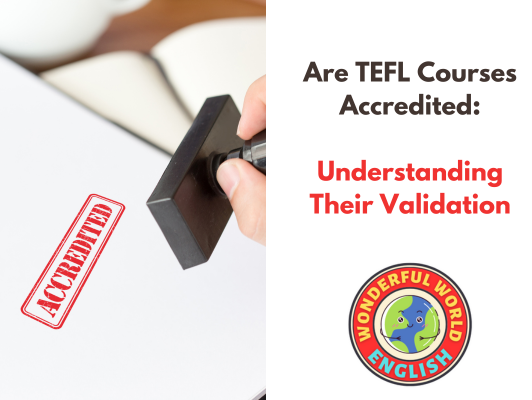Contents
Toggle
Meet David De’ Ath, founder, editor, and writer at Wonderful World English. With his extensive background as an English teacher, David provides valuable insights and practical tips on ESL for students and teachers alike.
When considering teaching English as a foreign language (TEFL), the accreditation of the course one chooses is a crucial factor.
TEFL courses are designed to provide the necessary qualification for individuals aiming to teach English abroad or online.
Accreditation serves as a benchmark for quality and reliability, which can vastly influence the acceptance of the certification by employers worldwide.
It reassures prospective teachers that the course content, teaching methods, and assessment are held to a high standard.
Furthermore, it ensures that the course has undergone meticulous evaluation by external bodies to verify its quality.
The landscape of TEFL certification is diverse, with options ranging from online TEFL courses to in-person training programs.
Accredited TEFL courses typically require a minimum of 120 hours of study and provide comprehensive training including practical teaching components.
However, the TEFL industry is largely unregulated, which means anyone looking to pursue TEFL courses must exercise due diligence in verifying a course’s accreditation status.
Reputable accrediting agencies will have their seals of approval visible and provide mechanisms for verification, distinguishing reputable courses from those that are not.
Key Takeaways
- Accreditation confirms the quality and acceptance of TEFL courses.
- TEFL certification requires rigorous study and training, typically involving a minimum of 120 hours.
- Ensuring a TEFL course is accredited is vital due to the unregulated nature of the industry.
Understanding TEFL Course Accreditation
When choosing a TEFL course, understanding the accreditation behind it is crucial.
Accreditation signifies the course’s adherence to educational standards and its recognition by professional entities.
What Is Accreditation and Why Is It Important?
Accreditation is a process of validation in which an institution’s services and operations are evaluated by an external body to determine if applicable standards are met.
If the standards are met, accredited status is granted by the agency.
In the context of TEFL, accreditation assures that a course is professionally recognized and meets the high standards of quality education.
Not only does accreditation provide a seal of approval for the educational content of a TEFL course, but it also is an important consideration for employers.
They often look for certification from an accredited TEFL program as proof of a candidate’s competency in teaching English as a foreign language.
Types of TEFL Accreditation Bodies
Various organizations grant accreditation to TEFL courses. These can include independent accrediting bodies, government agencies, and educational institutions.
In the UK, for example, accreditation may come from the Office of Qualifications and Examinations Regulation (Ofqual), demonstrating that the course meets specific criteria for quality control.
Internationally, TEFL courses might seek accreditation from the Accrediting Council for Continuing Education and Training (ACCET), which is recognized by the U.S. Department of Education and assures that the course has met stringent standards.
Recognized Accrediting Organizations
Several organizations are recognized globally for their rigorous standards in accrediting TEFL courses.
The Scottish Qualifications Authority (SQA) and the Open and Distance Learning Quality Council (ODLQC) are examples of such bodies known for their comprehensive review process.
Courses can also be accredited by the Distance Education Accrediting Commission (DEAC-approved), a U.S.-based organization recognized by the U.S. Department of Education and the Council for Higher Education Accreditation.
Related: Who Owns TEFL Certifications: Unpacking Ownership

Choosing the Right TEFL Course
Selecting an accredited TEFL course is crucial for educators seeking to teach English as a foreign language.
The course you choose can significantly impact your teaching opportunities and ability to deliver an effective education experience to EFL learners.
Factors to Consider When Selecting a TEFL Course
One must consider various critical factors when selecting a TEFL course.
Accreditation indicates that a third party has formally evaluated the course content and curriculum, ensuring its quality and relevance in the field of teaching English as a foreign language.
A TEFL course provider should be backed by internationally recognized accrediting bodies.
For those seeking comprehensive training, employers typically expect courses of at least 100 hours as an industry standard.
Instructors’ qualifications are also paramount; they should possess ample experience and credentials in TEFL.
- Accreditation: Seek out courses certified by reputable organizations.
- Hours of Training: Look for a minimum of 100 hours to ensure adequate preparation.
- Instructor Credentials: Verify the qualifications of the course educators.
Online vs. In-Person TEFL Courses
The mode of TEFL course delivery is another consideration.
Online TEFL courses offer flexibility and the convenience of studying from any location, making them suitable for individuals with busy schedules or remote learning preferences.
They can range from self-paced modules to structured online classes.
In-person TEFL courses, on the other hand, provide the opportunity for hands-on learning and immediate feedback, ideally suited for those who prefer a more traditional classroom environment.
- Online Courses: Flexible, self-paced, and accessible worldwide.
- In-Person Courses: Traditional, structured, and interactive.
The Value of Practicum in TEFL Training
A practicum component is a significant aspect of TEFL training, offering prospective teachers real-world teaching experience.
This hands-on training assists teachers in applying theoretical knowledge in a practical setting. Often, employers consider it an essential part of a TEFL qualification.
- Practicum: Essential for applying theory to practice.
Finally, there are different levels of TEFL qualifications, such as a level 3 TEFL certificate or a level 5 TEFL diploma.
The choice between them will depend on the individual’s career goals and the requirements of potential employers worldwide.
For a complete guide on TEFL certificates, check out the link below!
Related: TEFL Certificates: Your Guide to Teaching English Abroad

Conclusion
When delving into the world of TEFL, the accreditation of a chosen course stands as a critical determinant of its value and recognition in the global teaching community.
Accreditation not only assures the quality and rigor of a TEFL course but also influences its acceptance by employers worldwide, providing a testament to the holder’s proficiency in teaching English.
With the TEFL industry being largely unregulated, due diligence in selecting an accredited course becomes paramount, ensuring that the certification will be respected and valued wherever one’s teaching journey leads.
Whether opting for online or in-person courses, the accreditation status, backed by reputable agencies, guarantees that the course meets high educational standards, equipping teachers with the necessary skills and knowledge to excel in diverse teaching environments.
Ultimately, choosing an accredited TEFL course is a foundational step in building a credible and successful teaching career in the expansive realm of English language education.
We hope you find value in this information; you can contact us if you require any support.
Have a wonderful day!
Image Attribution: All images licensed via canva.com





